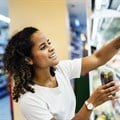Retail is renowned for being fast-paced and highly competitive. If anything, the pandemic has only intensified this, with evolving shopping habits and customer needs, and the growing adoption of digital shopping platforms.
South Africans’ shopping habits shifted significantly when the pandemic started, driven predominantly by lockdown restrictions that saw people do bigger, quicker, and more infrequent shops closer to home – but this behaviour has stuck.
People still tend to shop closer to where they live, and buy bigger baskets or trolleys of essential goods so that they don’t have to shop as frequently. More people are also using mobile apps and online platforms to have their groceries delivered directly to their doors.
Retailers have largely responded to these behavioural patterns and trends, with many of the country’s larger supermarkets introducing or adapting their apps and websites to become more user-friendly and meet customer needs and demands.
These changes are broadly the same across the rest of Africa and globally, and are set to accelerate and become more embedded: rapid change and volatility will continue to define the retail landscape going into 2022 and beyond.
Some of the biggest trends we can expect to see in the next year include:
1. “Tough times never last, only tough people last” – but even the tough are going to have to brace for ongoing rising food prices
Times are only going to get tougher as continually rising electricity and fuel prices drive the cost of food up – and forecasts show that this is set to continue into 2022. According to the Pietermaritzburg Economic Justice & Dignity group (PMBEJD)’s latest Household Affordability Index, the average South African household food basket cost R4,317,56 in October 2021 – increasing by R98,08 (2,3%) month-on-month, and R400,83 (10,2%) year-on-year.
All indications point to this trend continuing, which will put severe strain on South African consumers and households – meaning that retailers and brands will have to find innovative and meaningful ways to help consumers and remain relevant in uncertain and challenging times.
2. The pursuit of convenience means that online shopping will continue to grow, but retailers will need to focus on integrating online with physical store offerings
Research by the Economist Intelligence Unit shows that the growth of shopping applications will continue apace globally, driven by greater choice offered through mobile apps – and South Africa and the rest of the continent are closely following this trend.
However, this doesn’t mean that brick-and-mortar stores have become obsolete. Instead, physical stores will increasingly need to enhance their service offering of online channels. As the report noted, many shops offer a “click-n-collect” hybrid channel, and the shop itself serves as the pick-up point. Taking a multi-channel approach and bringing together the best of online and brick-and-mortar shopping offers the ability to tap into evolving and diverse customer needs.
Dr Beate Stiehler-Mulder and Kgaugelo Mehlape 23 Nov 2021 3. Sustainability continues to be a top priority for South African consumers – so brands need to illustrate their commitment to behaving in more sustainable and eco-friendly ways
A Mastercard study revealed that 98% of South African adults are willing to take action to combat environmental and sustainability issues, and that 76% feel it’s now more important for businesses and brands to do more for the environment.
This builds on a growing body of research undertaken over the past few years that illustrates the mounting importance of sustainability to South Africans: Nielsen’s Global Corporate Sustainability Report dating back to 2015, for example, showed that 68% of South African consumers were willing to pay more for products that came from brands showing a commitment to sustainable practices – which was higher than the global average of 66%.
A Consumer Sentiment in Retail Report for South Africa by Deloitte also showed that by 2019, social media conversations around sustainability and environmental impact in retail had increased substantially in South Africa. Millennials, in particular, were looking for more sustainable brands and products: seven out of 10 millennials said they were willing to pay more for a product with a conscience.
This indicates that sustainability consistently remains a priority for South African consumers and that to win customer trust and loyalty, retailers need to actively show how they are acting in a responsible and transparent way, such as moving away from single-use plastics, scrapping plastic bags and investing in bags and packaging that is both recycled and recyclable. Retailers will need to keep up this momentum and continue investing in innovative sustainability efforts.
4. Africa remains the final frontier as a driver of growth for retail
The Economist Intelligence Unit’s Retail 2022 report found that “retailers are already looking to invest in African markets now in order to reap the potential they may have ten or even 20 years down the line”. By 2030, according to the report, the top 18 cities in Africa could have a combined spending power of $1.3tn – and retail demand will see solid growth on the continent next year and into the next decade.
Unlocking this potential will require strong local partnerships and a deep understanding of local markets to meet consumer needs.
5. The search for the sweet spot means offering the right snack for the right moment made the right way
Every year, we conduct a global snack trends study, and our most recent State of Snacking report showed that 52% of adults around the world agreed that snacking has been a “lifeline” throughout the pandemic – which is likely to continue going into 2022 as the uncertainty created by the pandemic remains.
This indicates the importance of snacking right, and empowering people to snack right by offering the right snack for the right moment. This means giving people a wide range of high-quality snacks so they can make informed choices, making it easy for them to enjoy these snacks when and how it suits their lifestyles, and ensuring that they are not only right for people but also for the planet through sustainable sourcing and packaging.
Retailers and snack companies need to continue forging partnerships that help people snack better and make it seamless and convenient for them to do so.











































